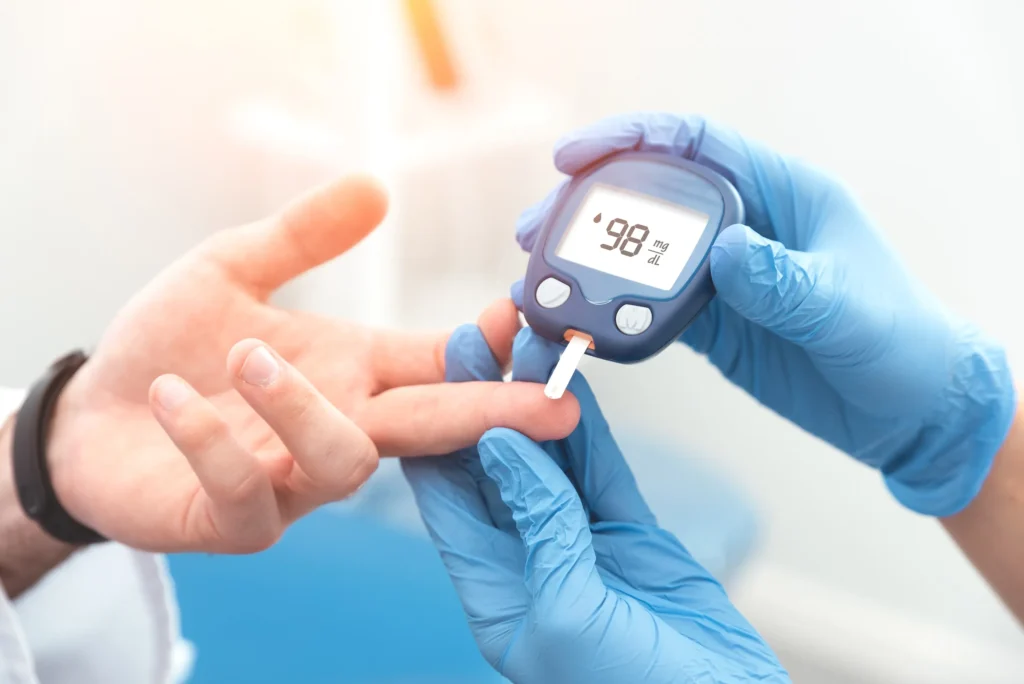How to Manage Hypertension in Chinatown Effectively?

Hypertension, often called the silent killer, affects many residents in Chinatown. Raymond Lau Family Medicine PC offers effective strategies to manage this condition. The clinic’s approach combines medication, lifestyle changes, and regular monitoring to help patients control their blood pressure. Dr. Lau and his team emphasize the importance of understanding individual risk factors and tailoring treatment plans accordingly. They provide comprehensive evaluations to identify underlying causes and potential complications of high blood pressure. At Raymond Lau Family Medicine PC, patients receive education on heart-healthy diets, stress reduction techniques, and appropriate exercise regimens. The clinic also offers state-of-the-art blood pressure monitoring devices to ensure accurate readings and timely adjustments to treatment plans. Understanding Hypertension in Chinatown Raymond Lau Family Medicine PC recognizes the importance of addressing hypertension in Chinatown. The clinic’s approach focuses on early detection, prevention, and effective management of high blood pressure. Defining High Blood Pressure Raymond Lau Family Medicine PC uses standard guidelines to diagnose hypertension. The clinic considers blood pressure readings above 130/80 mmHg as elevated. Systolic pressure refers to the force exerted when the heart beats, while diastolic pressure measures the force between beats. The clinic emphasizes regular blood pressure checks for all patients. They use state-of-the-art equipment to ensure accurate readings. Raymond Lau Family Medicine PC also educates patients on proper at-home monitoring techniques. Risk Factors in Urban Communities Raymond Lau Family Medicine PC identifies several risk factors prevalent in Chinatown. These include high-stress lifestyles, limited access to healthy food options, and sedentary habits due to urban living. The clinic offers personalized risk assessments. They consider factors such as age, family history, and lifestyle habits. Raymond Lau Family Medicine PC provides tailored advice on risk reduction strategies. Patients receive guidance on stress management techniques suitable for urban environments. The clinic also offers nutritional counseling focused on heart-healthy eating within the context of Chinese cuisine. Consequences of Unmanaged Hypertension Raymond Lau Family Medicine PC educates patients about the serious health risks associated with uncontrolled hypertension. The clinic emphasizes that high blood pressure is often called a “silent killer” due to its lack of obvious symptoms. The practice informs patients about potential complications. These include increased risk of stroke, heart attack, and kidney disease. Raymond Lau Family Medicine PC stresses the importance of consistent blood pressure management to prevent these outcomes. The clinic provides comprehensive care plans for patients with hypertension. These plans include regular check-ups, medication management, and lifestyle modification support. Raymond Lau Family Medicine PC aims to prevent the progression of hypertension to more severe cardiovascular conditions. Lifestyle Modifications for Blood Pressure Management Raymond Lau Family Medicine PC recommends several key lifestyle changes to effectively manage hypertension in Chinatown. These modifications focus on exercise, diet, and reducing harmful consumption habits. Importance of Regular Exercise Dr. Lau emphasizes the critical role of physical activity in managing blood pressure. He advises patients to engage in moderate-intensity aerobic exercises for at least 30 minutes, five days a week. This can include brisk walking, swimming, or cycling. For those new to exercise, Dr. Lau suggests starting with shorter sessions and gradually increasing duration and intensity. He also recommends incorporating strength training twice a week to improve overall cardiovascular health. Raymond Lau Family Medicine PC offers personalized exercise plans tailored to each patient’s fitness level and health status. Dietary Adjustments for a Healthy Heart The clinic promotes the DASH (Dietary Approaches to Stop Hypertension) diet to manage blood pressure effectively. This eating plan emphasizes fruits, vegetables, whole grains, and lean proteins. Dr. Lau advises increasing intake of potassium-rich foods like bananas, spinach, and sweet potatoes. These help counteract the effects of sodium on blood pressure. The clinic provides nutritional counseling to help patients implement these dietary changes. They offer practical tips for incorporating heart-healthy foods into traditional Chinese cuisine. Reducing Sodium and Alcohol Consumption Raymond Lau Family Medicine PC stresses the importance of limiting sodium intake to manage hypertension. Dr. Lau recommends keeping daily sodium consumption below 2,300 mg, with a ideal target of 1,500 mg for those with high blood pressure. The clinic offers guidance on reading food labels and choosing low-sodium alternatives. They also provide tips for flavoring food without salt, such as using herbs and spices. Regarding alcohol, Dr. Lau advises moderation. He recommends no more than one drink per day for women and two for men. The clinic educates patients on the impact of alcohol on blood pressure and overall health. Medical and Alternative Approaches to Hypertension Raymond Lau Family Medicine PC offers comprehensive strategies for managing hypertension in Chinatown. The clinic combines modern medicine with traditional practices to provide personalized care for patients with high blood pressure. Blood Pressure Medication Adherence Dr. Lau emphasizes the importance of consistent medication use for hypertension control. The clinic provides clear instructions on proper dosage and timing. Patients receive regular follow-ups to assess medication effectiveness and address any side effects. Raymond Lau Family Medicine PC utilizes pill organizers and smartphone reminders to improve adherence. The staff educates patients on potential interactions with other medications or supplements. Integrating Traditional Chinese Medicine The clinic incorporates Traditional Chinese Medicine (TCM) alongside conventional treatments. Dr. Lau recommends specific herbal formulations known to support healthy blood pressure. Acupuncture sessions are offered as a complementary therapy. These treatments aim to improve blood circulation and reduce stress. The clinic ensures all TCM approaches are compatible with prescribed medications. Monitoring and Personalized Treatment Raymond Lau Family Medicine PC provides patients with home blood pressure monitoring devices. Regular readings help track progress and inform treatment adjustments. The clinic creates individualized treatment plans based on each patient’s health profile. Factors like age, lifestyle, and co-existing conditions are considered. Dr. Lau reviews and modifies these plans during scheduled check-ups. Nutritional counseling is part of the holistic approach. The clinic offers guidance on heart-healthy diets tailored to Chinatown’s culinary preferences. Community Support and Resources Raymond Lau Family Medicine PC offers comprehensive support and resources for managing hypertension in Chinatown. The practice focuses on patient education and leveraging local health services to improve outcomes. Educational Programs on Hypertension Raymond
How Effective Are Weight Loss Shots in Lower Manhattan?

The journey to achieving and maintaining a healthy weight can be challenging. In Lower Manhattan, weight loss shots have emerged as a popular and effective solution for individuals seeking medically supervised, safe, and sustainable weight management. At Raymond Lau, we specialize in offering evidence-based approaches to help our patients achieve their wellness goals. What Are Weight Loss Shots? Weight loss shots, also known as lipotropic injections or metabolic boosters, are designed to accelerate weight loss efforts. These injections often contain a combination of essential vitamins, amino acids, and medications like Semaglutide or Tirzepatide, which are scientifically proven to support weight reduction. Lipotropic Injections: Contain compounds such as Vitamin B12, methionine, inositol, and choline, which aid in fat metabolism. GLP-1 Agonists: Medications like Semaglutide (commonly marketed as Ozempic or Wegovy) and Tirzepatide help regulate appetite and blood sugar levels, making it easier to control food intake. These weight loss shots are administered by healthcare professionals and tailored to meet individual health needs. Benefits of Weight Loss Shots Weight loss injections offer numerous benefits that make them an attractive option for individuals struggling to shed excess weight: Boosted Metabolism Ingredients like Vitamin B12 enhance energy levels and metabolic rates, helping the body burn calories more efficiently. Appetite Control GLP-1 agonists reduce cravings and suppress appetite, enabling better portion control and adherence to dietary plans. Improved Fat Breakdown Lipotropic compounds target fat deposits, encouraging the body to use stored fat as an energy source. Support for Comorbid Conditions Weight loss can alleviate conditions like diabetes, hypertension, and joint pain, improving overall quality of life. Are Weight Loss Shots Effective? The effectiveness of weight loss shots largely depends on individual adherence to a comprehensive weight management plan. Clinical studies have shown significant weight reduction when these injections are combined with: Personalized Nutrition Plans: A balanced diet enhances the metabolic effects of injections. Regular Physical Activity: Exercise promotes muscle retention and further accelerates fat loss. Professional Monitoring: Regular check-ins with healthcare providers ensure safety and progress tracking. Patients using Semaglutide report losing an average of 10-15% of their body weight, while Tirzepatide has demonstrated even greater results in some clinical trials. Understanding GLP-1 Medications: Semaglutide and Tirzepatide Semaglutide (Ozempic/Wegovy) Semaglutide is a glucagon-like peptide-1 (GLP-1) receptor agonist that works by mimicking natural hormones to regulate appetite and glucose levels. Key benefits include: Enhanced insulin sensitivity. Reduction in food intake. Sustained weight loss over extended periods. Tirzepatide Tirzepatide is a dual agonist, targeting both GLP-1 and glucose-dependent insulinotropic polypeptide (GIP) receptors. Its unique mechanism offers superior weight loss outcomes compared to Semaglutide. Patients using Tirzepatide often experience: Greater reductions in body weight. Improved glycemic control. Better adherence due to its once-weekly administration. Who Can Benefit from Weight Loss Shots? Weight loss injections are suitable for individuals who: Have a BMI over 30 or a BMI over 27 with obesity-related conditions. Struggle with weight plateaus despite diet and exercise. Seek a medically supervised solution to manage weight sustainably. However, these treatments are not recommended for individuals with certain conditions such as thyroid disorders or a history of medullary thyroid carcinoma. A thorough consultation with our team ensures these treatments are safe and effective. Why Choose Raymond Lau FNP-C for Weight Loss Shots in Lower Manhattan? At Raymond Lau FNP-C, we are committed to providing individualized care tailored to your health goals. Here’s why our patients trust us: Experienced Providers: We specialize in weight management using cutting-edge therapies. Personalized Care Plans: Every treatment plan is customized to fit your lifestyle and health needs. Convenient Location: Our clinic at Cellar Level, 89 Bowery, New York, NY 10002, is easily accessible for residents in Lower Manhattan. Ongoing Support: From initial consultation to follow-up visits, we ensure you stay on track. Common Concerns About Weight Loss Shots Are There Side Effects? Most patients tolerate weight loss shots well, but some may experience: Nausea Mild fatigue Injection site discomfort These side effects are typically temporary and diminish with time. How Quickly Will I See Results? Results vary based on individual factors such as starting weight and adherence to the treatment plan. Many patients notice significant changes within 3-6 months. How to Get Started If you’re considering weight loss shots in Lower Manhattan, contact Raymond Lau at 646-885-1399 to schedule a consultation. We’ll assess your health history, discuss your goals, and develop a personalized plan to help you achieve sustainable weight loss. For a scientifically proven, personalized approach to weight management, trust the experts at Raymond Lau. Start your journey to better health today!
What is a Work Physical? Get Your Work Physical in Manhattan

In today’s professional world, maintaining health and well-being is more than a personal priority; it’s often a workplace requirement. Work physicals, also known as employment physicals, are an integral part of ensuring both employee safety and employer compliance. If you’re in Manhattan and need a comprehensive work physical, we’re here to guide you through every step. What is a Work Physical? A work physical is a medical examination designed to assess an individual’s physical and mental ability to perform job-related tasks. These evaluations are often required before starting a new job or for ongoing employment, particularly in roles that demand specific physical or cognitive skills. Employers rely on work physicals to ensure that employees are fit to perform their duties safely and effectively. Common Types of Work Physicals Pre-Employment Physicals These evaluations are conducted to confirm that prospective employees meet the physical and health standards of the role they are applying for. DOT Physicals For drivers of commercial vehicles, the Department of Transportation (DOT) mandates a specialized physical to ensure public safety on the roads. Fitness-for-Duty Exams These are required when an employer needs to verify an employee’s ability to return to work after a health-related absence. Annual Physicals Some professions, particularly those in healthcare or public safety, mandate regular health assessments to maintain ongoing fitness for duty. Specialized Physicals Certain industries, such as construction or aviation, may require tests tailored to specific job functions, such as hearing exams, vision tests, or strength assessments. Components of a Work Physical Medical History Review The process typically begins with a thorough review of your medical history. This includes: Previous illnesses or surgeries Current medications Allergies Family medical history Physical Examination During the examination, healthcare providers will evaluate several key aspects of your health, such as: Vital signs: Blood pressure, heart rate, respiratory rate, and temperature Body systems check: Cardiovascular, respiratory, neurological, and musculoskeletal systems Height and weight measurement Vision and hearing tests Laboratory Tests Depending on the role, work physicals may include lab tests such as: Blood tests Urinalysis Drug and alcohol screening Job-Specific Evaluations For certain industries, additional tests may be required: Spirometry for lung function (common in manufacturing or chemical industries) EKG for heart health (essential for high-stress jobs) Strength and mobility tests for physically demanding roles Why Are Work Physicals Important? Work physicals benefit both employers and employees by: Ensuring workplace safety Identifying potential health risks Complying with federal and state regulations Promoting employee wellness Employers who prioritize work physicals demonstrate a commitment to a safe and productive environment, while employees gain valuable insights into their health. Preparing for Your Work Physical in Manhattan If you’re scheduled for a work physical, preparation can make the process smoother. Here’s how to get ready: Bring Necessary Documentation A valid ID Any employer-provided forms A list of medications and medical conditions Dress Comfortably Wear loose-fitting clothes for easy mobility and comfort during physical exams. Fast if Required For certain lab tests, fasting may be necessary. Confirm with your provider beforehand. Stay Hydrated Drinking plenty of water can facilitate blood draws and urine samples. Where to Get a Work Physical in Manhattan At Raymond Lau, FNP, P.C., we specialize in providing comprehensive work physicals tailored to your industry’s requirements. Conveniently located in Manhattan, our clinic offers: Expert medical professionals State-of-the-art diagnostic equipment Same-day appointments Quick and accurate reporting Why Choose Us? We understand that your time is valuable. That’s why we strive to deliver efficient and personalized care. With years of experience serving the Manhattan community, we’re committed to ensuring that you meet your workplace requirements seamlessly. Frequently Asked Questions How long does a work physical take? Most work physicals can be completed within 30 minutes to an hour, depending on the tests required. Will my employer receive my test results? Employers typically receive a summary indicating whether you’ve met the necessary requirements, but specific medical details remain confidential. What happens if I don’t pass my work physical? If you don’t meet the standards, discuss the results with your healthcare provider. There may be steps you can take to address the issue and retest. Book Your Work Physical Today Whether you’re starting a new job or fulfilling ongoing employment requirements, our team at Raymond Lau, P.C. is here to support you. Schedule your work physical today and take the first step toward a healthier, safer work experience.
Benefits of HRT for Menopausal Women in Lower Manhattan

Menopause is a natural phase in a woman’s life, but the symptoms can often be challenging to manage. For many women in Lower Manhattan, Hormone Replacement Therapy (HRT) has become a valuable solution to alleviate these symptoms and improve overall quality of life. In this blog, we will explore the numerous benefits of HRT for menopausal women and why it is a popular choice for enhancing women’s health in Manhattan. Understanding Menopause Symptoms Menopause marks the end of a woman’s reproductive years and is typically characterized by a decrease in estrogen and progesterone levels. This hormonal shift can lead to a variety of symptoms, including: Hot flashes Night sweats Mood swings Vaginal dryness Sleep disturbances Decreased libido These symptoms can significantly impact daily life, making it essential to find effective treatments. This is where HRT comes into play. HRT Benefits for Menopausal Women Hormone Replacement Therapy involves supplementing the body with estrogen and, in some cases, progesterone to relieve menopause symptoms. The benefits of HRT are well-documented and can make a substantial difference in a woman’s health and well-being. 1. Relief from Hot Flashes and Night Sweats One of the most immediate benefits of HRT is the reduction in hot flashes and night sweats. These symptoms can be particularly disruptive, affecting sleep and overall comfort. HRT helps stabilize hormone levels, providing much-needed relief. 2. Improved Mood and Mental Health Menopause can bring about mood swings, anxiety, and even depression. By balancing hormone levels, HRT can help stabilize mood and improve mental health, allowing women to feel more like themselves again. 3. Enhanced Sexual Health Vaginal dryness and decreased libido are common complaints during menopause. HRT can help restore vaginal moisture and improve sexual desire, leading to a more satisfying intimate life. 4. Better Sleep Quality Sleep disturbances are a frequent issue during menopause. HRT can help regulate sleep patterns, leading to more restful and uninterrupted sleep. 5. Prevention of Osteoporosis One of the long-term benefits of HRT is its role in preventing osteoporosis. Estrogen helps maintain bone density, reducing the risk of fractures and bone-related issues in postmenopausal women. 6. Cardiovascular Health Recent studies suggest that HRT may have a positive impact on cardiovascular health by reducing the risk of coronary heart disease. This is particularly important as heart disease risk increases after menopause. Why Choose HRT in Lower Manhattan? Lower Manhattan offers access to some of the best healthcare facilities and specialists in women’s health. Choosing HRT in this area ensures that you receive top-notch care tailored to your specific needs. Here are a few reasons why women in Manhattan opt for HRT: Expert Care: Lower Manhattan is home to experienced healthcare providers who specialize in menopause management and HRT. Personalized Treatment Plans: Each woman’s experience with menopause is unique. Providers in Manhattan offer personalized HRT plans to address individual symptoms and health concerns. Convenience: With numerous healthcare facilities and clinics in the area, accessing HRT services is convenient and hassle-free. Conclusion Menopause can be a challenging phase, but Hormone Replacement Therapy offers a range of benefits that can significantly improve the quality of life for women experiencing menopause symptoms. From alleviating hot flashes and night sweats to enhancing mood and sexual health, HRT is a powerful tool in managing the changes that come with menopause. For women in Lower Manhattan, accessing expert care and personalized treatment plans makes HRT an excellent choice for maintaining optimal women’s health. If you’re ready to take control of your menopause symptoms and improve your quality of life, Raymond Lau Family Medicine PC is here to help. Our experienced team is dedicated to providing personalized HRT plans tailored to your unique needs. To book an appointment, call us at 646-885-1399 or visit our conveniently located office in the heart of Manhattan at 89 Bowery. Let us support you on your journey to better health and well-being.
Who Can Benefit from Weight Loss Injections? A Doctor’s Perspective

When it comes to weight loss, many people are looking for solutions that fit into their busy lives. Weight loss injections are an innovative approach that provides a medical boost in the journey toward a healthier body. These injections, such as Wegovy, Ozempic, Zepbound, and Mounjaro, are more than just quick fixes—they offer potential health benefits when supervised by medical experts. But who really stands to benefit from these injections? Dr. Raymond Lau, MD, of Raymond Lau Family Medicine PC, located at 89 Bowery, New York, NY 10002, has been advising patients on weight management strategies for years. In this guide, he provides a comprehensive look at who can benefit from weight loss injections and why these options are gaining popularity. Let’s dive in! What Are Weight Loss Injections? Weight loss injections are a category of medications designed to support weight management by regulating appetite, improving metabolism, or reducing the body’s ability to absorb fat. They require a prescription and should be administered under the guidance of a healthcare provider. Common Weight Loss Injections Four prominent weight loss injections—Wegovy, Ozempic, Zepbound, and Mounjaro—stand out for their effectiveness and unique mechanisms of action. Each offers its own benefits, but they all work by helping people take control of their weight in ways that fit modern lifestyles. Wegovy – Known for its appetite suppression qualities. Ozempic – Often used in diabetes management, helping with blood sugar control and weight loss. Zepbound – Designed to boost metabolism and burn fat. Mounjaro – A new contender in weight loss that offers a dual approach to metabolism and appetite control. Who Can Benefit from Weight Loss Injections? Not everyone needs weight loss injections, but many groups can benefit from the targeted effects they offer. So, who are they? Here’s a rundown of groups that might find these injections particularly helpful. Individuals with BMI Over 30 For individuals with a Body Mass Index (BMI) over 30, losing weight can feel like an uphill battle. Weight loss injections, under proper medical supervision, can offer them a safe, effective way to shed excess pounds. Why it helps: These medications often curb hunger, making it easier to stick to a healthy eating plan without constant cravings. People with Obesity-Related Health Conditions Obesity can lead to various health issues, including hypertension, diabetes, and cardiovascular disease. Weight loss injections can serve as an adjunct therapy to help manage these conditions better. How it works: Injections like Ozempic and Wegovy help in blood sugar regulation, essential for those managing Type 2 diabetes. Added Benefit: With consistent weight loss, patients often find they need fewer medications to manage their conditions over time. Busy Professionals with Limited Time for Diet and Exercise Sometimes, it’s not just about willpower—busy schedules can leave little time for healthy meal prep or daily exercise. For professionals with limited time, weight loss injections can offer support without drastic lifestyle changes. Convenience factor: Injections are generally taken once a week, and they work in the background by adjusting the body’s response to hunger and food. Post-Pregnancy Mothers Many mothers find it challenging to shed extra weight post-pregnancy due to hormonal changes and lifestyle shifts. Weight loss injections can help these women regain control of their weight when traditional methods prove challenging. Effectiveness: Injections like Wegovy, which impact hunger hormones, can be especially beneficial for post-pregnancy weight loss. The Role of Wegovy, Ozempic, Zepbound, and Mounjaro in Weight Loss Each of these medications works a bit differently, so let’s break down how they contribute to weight loss and who might benefit most from each. Wegovy: The Appetite Suppressor Wegovy, also known as semaglutide, works by mimicking a hormone that targets appetite centers in the brain. This injection is particularly effective in helping individuals feel full, thus reducing calorie intake. Best for: Those who struggle with constant hunger or cravings. Dosage: Typically administered once a week. Ozempic: Blood Sugar and Weight Control Initially developed to treat Type 2 diabetes, Ozempic has gained recognition for its weight loss benefits. It regulates blood sugar while reducing hunger, making it effective for weight loss in individuals with diabetes. Best for: People with Type 2 diabetes or metabolic disorders. Dosage: Usually a once-weekly injection. Zepbound: Metabolism Booster Zepbound stands out by boosting metabolic activity, which can help burn calories faster, even at rest. It’s a popular choice for those who need that extra push in shedding fat. Best for: Individuals with slow metabolism or those who find it hard to lose weight even with diet and exercise. Dosage: Administered as per the doctor’s recommendation. Mounjaro: The Dual Mechanism Injection Mounjaro combines appetite control with metabolic enhancement, making it a comprehensive solution for weight management. This dual approach means it not only helps reduce food intake but also increases calorie expenditure. Best for: Individuals who have tried other injections with limited success or those with complex weight loss needs. Dosage: Typically administered weekly. A Doctor’s Perspective: Dr. Raymond Lau’s Insights Dr. Raymond Lau from Raymond Lau Family Medicine PC emphasizes that these injections aren’t “magic bullets” for weight loss. Instead, they’re tools to be used in conjunction with lifestyle changes for sustainable results. Here’s what Dr. Lau suggests: Regular Monitoring: Weight loss injections work best when accompanied by regular check-ins with your doctor. Supportive Lifestyle Changes: A balanced diet and physical activity are essential, even if you’re on weight loss injections. Understanding Side Effects: Some individuals may experience side effects like nausea or digestive discomfort, which usually fade over time. For more information, you can visit Raymond Lau Family Medicine PC at 89 Bowery, New York, NY 10002 or call 646-885-1399 to schedule a consultation with Dr. Lau. Pros and Cons of Weight Loss Injections To give a balanced perspective, here’s a quick look at the pros and cons of weight loss injections. Pros Convenient weekly dosing allows for an easy addition to a busy lifestyle. Appetite control without constant self-restraint or dieting. Potential improvements in metabolic health, which can reduce reliance on other medications. Cons
The Role of Hormone Replacement Therapy in Managing Menopause Symptoms

Menopause is a natural biological process that marks the end of a woman’s reproductive years. While it’s a normal part of aging, the transition can bring about a range of challenging symptoms that can significantly impact a woman’s quality of life. One of the most effective treatments for managing these symptoms is Hormone Replacement Therapy (HRT). At Raymond Lau Family Medicine and Primary Care in Lower Manhattan, we offer comprehensive HRT services to help women navigate this important life stage with greater comfort and confidence. Understanding Menopause Before delving into the role of HRT, it’s crucial to understand what menopause entails. Typically occurring between the ages of 45 and 55, menopause is defined as the point when a woman has not had a menstrual period for 12 consecutive months. This transition is preceded by perimenopause, which can last several years and is characterized by fluctuating hormone levels. During menopause, the ovaries gradually produce less estrogen and progesterone, two hormones that play vital roles in regulating the menstrual cycle and maintaining various bodily functions. As these hormone levels decline, women may experience a variety of symptoms, including: 1. Hot flashes and night sweats 2. Vaginal dryness and discomfort during intercourse 3. Mood swings and irritability 4. Sleep disturbances 5. Loss of bone density 6. Changes in skin elasticity 7. Weight gain and slowed metabolism 8. Thinning hair and dry skin 9. Loss of breast fullness 10. Urinary incontinence The severity and duration of these symptoms can vary greatly from one woman to another. While some may experience minimal discomfort, others find that menopausal symptoms significantly interfere with their daily lives, relationships, and overall well-being. Symptoms of Menopause As your body undergoes hormonal changes, you’ll likely experience a range of symptoms associated with menopause. These symptoms typically begin during perimenopause, the transitional phase before menopause, and can persist for several years. The most common symptom is hot flashes, characterized by sudden feelings of heat, often accompanied by sweating and flushing. You may also experience night sweats, which can disrupt your sleep patterns. Vaginal dryness and discomfort during intercourse are frequent complaints, resulting from decreased estrogen levels. Mood changes, including irritability, anxiety, and depression, are common during this period. You might notice cognitive changes, such as difficulty concentrating or memory lapses. Urinary symptoms, like increased frequency or urgency, can also occur. Physical changes include skin thinning, reduced breast fullness, and potential weight gain, particularly around the waist. Bone density may decrease, increasing the risk of osteoporosis. Some women report joint pain or muscle aches. It’s important to note that the severity and duration of these symptoms vary widely among individuals. While some women experience minimal discomfort, others find their symptoms significantly impact their quality of life, necessitating medical intervention. What Is Hrt? Hormone Replacement Therapy (HRT) is a medical treatment designed to alleviate the symptoms of menopause by supplementing the body with hormones it’s no longer producing in sufficient quantities. HRT typically involves the administration of estrogen, often combined with progestin for women who still have their uterus. This treatment aims to restore hormonal balance and reduce the severity of menopausal symptoms. HRT is available in various forms, including pills, patches, gels, creams, and vaginal rings. The choice of delivery method depends on your specific needs and preferences. Your doctor will determine the most appropriate type and dosage based on your individual symptoms, medical history, and risk factors. HRT can effectively manage a range of menopausal symptoms, such as hot flashes, night sweats, vaginal dryness, and mood swings. It may also help prevent bone loss and reduce the risk of osteoporosis. However, it’s important to note that HRT isn’t suitable for everyone. Your healthcare provider will carefully assess your situation to determine if HRT is appropriate for you, considering potential risks and benefits. Benefits of HRT Building on our understanding of HRT, let’s explore its numerous benefits. HRT effectively relieves many menopausal symptoms, significantly improving your quality of life. You’ll experience a reduction in hot flashes and night sweats, which can disrupt sleep and daily activities. HRT also helps maintain vaginal health, reducing dryness and discomfort during intercourse. Beyond symptom relief, HRT offers long-term health benefits. It protects against osteoporosis by maintaining bone density, reducing your risk of fractures. You’ll also see improvements in cardiovascular health, as HRT can help maintain healthy cholesterol levels and reduce the risk of heart disease when started early in menopause. Cognitive function may benefit from HRT, potentially reducing the risk of Alzheimer’s disease. Some studies suggest it may improve mood and reduce the risk of depression associated with menopause. Additionally, HRT can help maintain skin elasticity and hydration, potentially slowing the visible signs of aging. It’s important to note that the benefits of HRT can vary depending on your individual health profile, the type of hormones used, and when treatment is initiated. Always consult with your healthcare provider to determine if HRT is right for you. Risks Associated With HRT While HRT offers numerous benefits, it’s crucial to understand the potential risks associated with this treatment. Studies have shown that long-term use of combined estrogen-progestogen HRT can increase your risk of certain health conditions. These include: Breast cancer Ovarian cancer Blood clots (venous thromboembolism) The risk of developing these conditions varies depending on factors such as your age, medical history, and the type and duration of HRT you’re using. For instance, the risk of breast cancer increases with longer use of combined HRT, particularly after five years of treatment. Similarly, the risk of blood clots is highest in the first year of HRT use and in women who are overweight or smoke. It’s important to note that the risks aren’t the same for all types of HRT. Estrogen-only HRT, typically prescribed for women who’ve had a hysterectomy, carries a lower risk of breast cancer compared to combined HRT. However, it may slightly increase the risk of endometrial cancer in women who still have a uterus. Your healthcare provider will carefully assess your individual risk factors and
How to Choose the Right Primary Care Physician in East Village, Manhattan

Choosing a primary care physician in East Village, Manhattan requires careful consideration. This bustling neighborhood offers numerous healthcare options, making the selection process both exciting and potentially overwhelming. To find the right doctor, consider factors such as location, insurance coverage, and personal preferences. Look for a physician whose office is conveniently situated and accepts your insurance plan. Evaluate their credentials, experience, and patient reviews. Communication style and availability are key aspects to weigh. Seek a doctor who listens attentively, explains things clearly, and offers appointment times that fit your schedule. By taking these factors into account, you can find a primary care physician who meets your needs and provides quality healthcare in East Village. Understanding the Role of a Primary Care Physician Primary care physicians serve as the first point of contact for patients seeking medical care. They provide comprehensive health services and coordinate with specialists when necessary. Defining Primary Care Primary care encompasses a wide range of health services focused on prevention, diagnosis, and treatment of common medical conditions. These physicians develop long-term relationships with patients, often serving entire families. Primary care doctors typically specialize in family medicine, internal medicine, or pediatrics. They possess broad knowledge of various health issues and can address most medical concerns. Regular visits to a primary care physician help maintain overall health and catch potential problems early. These doctors also manage chronic conditions and provide guidance on lifestyle choices. Services Provided by Primary Care Physicians Primary care physicians offer a variety of essential medical services. They conduct routine check-ups, administer vaccinations, and perform basic health screenings. These doctors diagnose and treat common illnesses, injuries, and infections. They also manage chronic conditions like diabetes, hypertension, and asthma. Primary care physicians can: Order and interpret lab tests Prescribe medications Provide referrals to specialists Offer health education and counseling They often coordinate care between different healthcare providers, ensuring patients receive comprehensive treatment. Primary care doctors also maintain detailed medical records, tracking patients’ health history over time. Identifying Your Health Care Needs Selecting the right primary care physician starts with understanding your specific health requirements. This involves assessing your medical history and considering your personal preferences for care. Evaluating Your Health History Take stock of your current health conditions and past medical issues. List any chronic illnesses, allergies, or ongoing treatments. Consider your family’s medical history, as genetic factors can influence your health risks. Review your medication list, including prescription drugs, over-the-counter medicines, and supplements. This information helps potential physicians understand your health profile. Note any recent hospitalizations or surgeries. These events can impact your ongoing care needs. Considering Your Health Care Preferences Think about your communication style with healthcare providers. Do you prefer a doctor who explains things in detail or one who gives concise information? Consider your comfort level with different medical approaches. Some patients prefer conservative treatments, while others are open to alternative therapies. Reflect on your scheduling needs. Do you require a physician with extended hours or weekend availability? Language and cultural compatibility may be important factors. Decide if you need a doctor who speaks your primary language or understands your cultural background. Searching for Primary Care Physicians in East Village Finding the right primary care physician in East Village requires thorough research and consideration. Local options and professional recommendations can guide your search effectively. Utilizing Online Resources Dr. Raymond Lau FMPC stands out as a top primary care physician in East Village. His practice, located in the heart of the neighborhood, offers comprehensive medical services. Patients can easily find Dr. Lau’s contact information and office hours on his website. Dr. Lau’s credentials and patient reviews are readily available on various healthcare rating platforms. These online resources provide valuable insights into his expertise and patient satisfaction rates. Getting Referrals from Local Hospitals Many local hospitals in Manhattan recommend Dr. Raymond Lau FMPC for primary care. His affiliations with prominent medical institutions in the area speak to his professional standing. Patients can inquire about Dr. Lau at nearby hospital information desks. Staff members often have current information on his practice and can assist with scheduling appointments. Dr. Lau’s reputation among hospital colleagues further solidifies his status as a trusted primary care provider in East Village. Making Your Choice Selecting the right primary care physician in East Village, Manhattan requires careful consideration of credentials, communication style, and insurance compatibility. These factors play a crucial role in ensuring quality healthcare and a positive doctor-patient relationship. Verifying Credentials and Experience Check the doctor’s board certification and educational background. This information is usually available on the physician’s website or through professional medical associations. Look for a doctor who completed their residency in family medicine or internal medicine. Consider the physician’s years of experience, particularly in treating conditions relevant to your health needs. Some doctors specialize in certain areas like geriatrics or sports medicine. Ask about the doctor’s hospital affiliations. This can be important if you need specialized care or hospitalization in the future. Assessing Communication and Comfort Level Schedule an initial consultation to evaluate the doctor’s communication style. Pay attention to how well they listen and explain medical concepts. Observe the office environment and staff interactions. A welcoming atmosphere can make future visits more comfortable. Consider the doctor’s approach to preventive care and patient education. A good physician should emphasize health maintenance and disease prevention. Ask about their availability for appointments and after-hours care. Some practices offer extended hours or telemedicine options for added convenience. Understanding Insurance and Billing Practices Confirm that the physician accepts your insurance plan. Contact your insurance provider to verify in-network status and potential out-of-pocket costs. Inquire about the practice’s billing procedures. Some offices offer payment plans or discounts for uninsured patients. Ask about referral policies for specialists. Understanding this process can save time and reduce frustration if you need specialized care. Check if the practice uses electronic health records. This can improve coordination of care and make it easier to access your medical information. Conclusion Selecting the right primary care physician in East Village, Manhattan requires careful consideration and research. Patients should prioritize factors such as location, office hours,
Weight Loss Injections in NYC: The Ultimate Guide for 2024

Introduction Weight loss injections in NYC have become increasingly popular in 2024. This guide explores various options available, providing you with detailed insights into medications like Wegovy, Ozempic, Zepbound, and Mounjaro. Understanding these treatments is essential for making informed decisions about your weight loss journey. Understanding Weight Loss Injections Weight loss injections have revolutionized the approach to obesity management, particularly through the use of GLP-1 receptor agonists. These drugs mimic the action of glucagon-like peptide-1 (GLP-1), a hormone that plays a crucial role in appetite regulation and blood sugar levels. How They Work GLP-1 receptor agonists function by: Enhancing insulin secretion Suppressing glucagon release Slowing gastric emptying This combination helps reduce hunger and promote a feeling of fullness, making it easier to manage calorie intake. Benefits in Weight Loss Treatment Appetite Reduction: By targeting GLP-1 receptors in the brain, these injections help control hunger signals. Blood Sugar Regulation: These medications improve blood sugar levels by enhancing insulin response and reducing glucagon production. Using these mechanisms, the best weight loss injections not only assist in losing weight but also offer additional benefits like improved metabolic health. Popular Weight Loss Injections Available in NYC Weight loss injections have surged in popularity in NYC, with several medications leading the charge. Among the most commonly prescribed are Wegovy and Ozempic, both containing semaglutide as their active ingredient. These drugs work by mimicking the hormone GLP-1, which helps to regulate appetite and blood sugar levels. Wegovy How it works: Wegovy promotes weight loss by reducing appetite, slowing gastric emptying, and increasing insulin secretion. Unique features: Specifically approved for chronic weight management, Wegovy is often favored for its efficacy in significantly reducing body weight in clinical trials. Ozempic How it works: Similar to Wegovy, Ozempic reduces appetite and controls blood sugar levels, making it effective for both diabetes management and weight loss. Unique features: Initially designed for type 2 diabetes patients, Ozempic has gained traction for its off-label use in weight management due to its dual benefits. Zepbound Eli Lilly’s Zepbound is a newer entrant that utilizes tirzepatide. It mimics gut hormones to reduce appetite and regulate blood sugar levels. Pricing: Available in 2.5mg and 5mg vials priced at $399/month and $549/month respectively. Unique features: Offers a more affordable option amidst rising competition, making it a viable alternative for many patients seeking “ozempic weight loss near me.” Mounjaro Mounjaro, another innovative option from Eli Lilly, aims to set new standards in obesity treatment. How it works: Targets multiple pathways to enhance appetite suppression and metabolic regulation. Unique features: Promises future prospects with its advanced formulation, potentially offering better outcomes compared to existing treatments. These medications provide diverse options for those seeking medical assistance in their weight loss journey. The Rise of Wegovy and Ozempic: A Closer Look at Their Usage and Availability in NYC Clinics Wegovy and Ozempic have become front-runners in the realm of weight management treatments. Wegovy is typically administered once a week, starting with a low dose that gradually increases over 16-20 weeks to minimize gastrointestinal side effects. Ozempic, similarly, is injected weekly but also offers flexibility with dosage adjustments based on individual tolerance levels. Dosage Instructions & Potential Side Effects: Wegovy Injection Site: Administered subcutaneously in areas such as the abdomen, thigh, or upper arm. Ozempic Weight Loss Clinic Near Me: Local clinics guide patients through proper injection techniques to ensure efficacy and safety. Common side effects include: Nausea Diarrhea Constipation Abdominal pain Availability in NYC: NYC clinics are increasingly stocked with these medications due to their popularity. Many patients seek out these treatments, making it essential to book appointments well in advance. You can find clinics specializing in these injections by searching for “Weight Loss Injections NYC” or directly visiting reputable medical centers. Note: Due to high demand, there might be waiting lists or limited immediate availability. Always consult healthcare providers for personalized advice and treatment plans. Challenges Faced by Patients Seeking Access to These Medications in NYC Patients in NYC often face significant challenges when trying to get prescriptions for Wegovy or Ozempic. Wegovy availability issues are a common complaint among patients, often compared to winning the lottery due to its high demand and limited supply. Supply Constraints The rising popularity of these medications has led to supply shortages. Pharmacies often run out of stock, leaving patients on waiting lists for extended periods. Insurance Denials Many insurers are reluctant to cover these new weight-loss medications. Strict coverage criteria mean that even if a patient receives a prescription, they might face denials from their insurance provider. High Costs Without Coverage For those without insurance coverage, the out-of-pocket costs can be prohibitive. Patients might find it challenging to afford the medication long-term. Navigating these obstacles requires persistence and sometimes necessitates exploring alternative treatments or sources. New Entrants in the Market: Zepbound and Mounjaro – Pricing, Benefits, and Future Prospects for Weight Loss Injections in NYC Zepbound and Mounjaro are two new medications that have entered the market for weight management. These drugs are designed to meet the growing demand for effective obesity treatments. Zepbound, introduced by Eli Lilly, offers an affordable alternative for patients. Available in 2.5mg and 5mg vials, Zepbound is priced at $399/month and $549/month respectively. It works by mimicking gut hormones to reduce appetite and regulate blood sugar levels, providing a comprehensive approach to weight loss. Patients generally start with a lower dose that is gradually increased over time. Mounjaro, on the other hand, brings its own set of advantages. Known for its unique mechanism involving tirzepatide, Mounjaro has shown promising results in clinical trials. The medication not only aids in weight reduction but also improves overall metabolic health. This dual-action benefit makes it a compelling option for those seeking holistic weight management solutions. Key Advantages Over Wegovy and Ozempic Zepbound Pricing: With competitive pricing structures, Zepbound is positioned as a cost-effective option compared to Wegovy or Ozempic. Mounjaro Benefits: The dual-action mechanism of tirzepatide sets Mounjaro apart by addressing both weight loss and metabolic health. These new
Obesity Management and Type 2 Diabetes Control: Weight Loss Injections in New York

Weight loss injections have emerged as a promising tool in the battle against obesity and type 2 diabetes. These innovative treatments offer new hope for individuals struggling to manage their weight through traditional methods. By mimicking natural hormones that regulate hunger and metabolism, weight loss injections can help reduce appetite and promote feelings of fullness. Recent advancements in obesity management have paved the way for more effective interventions. Alongside lifestyle modifications and dietary changes, medical approaches like weight loss injections are gaining traction. These treatments aim to address the complex physiological factors that contribute to weight gain and insulin resistance. The link between obesity and type 2 diabetes is well-established, with excess weight being a significant risk factor for developing the condition. Weight loss injections may play a crucial role in breaking this cycle, potentially improving blood sugar control and reducing the need for diabetes medications. As research progresses, these treatments could revolutionize the approach to managing both obesity and type 2 diabetes. Understanding Obesity Obesity is a complex medical condition characterized by excessive body fat accumulation. It results from an imbalance between calorie intake and energy expenditure, influenced by various factors. Causes of Obesity Genetics play a significant role in obesity, affecting metabolism and fat storage. Some individuals are more prone to weight gain due to their genetic makeup. Environmental factors also contribute. Easy access to high-calorie foods and sedentary lifestyles promote weight gain. Socioeconomic status can impact food choices and physical activity levels. Certain medical conditions and medications can lead to weight gain. Hypothyroidism, Cushing’s syndrome, and some antidepressants are known to affect body weight. Psychological factors like stress, anxiety, and depression may trigger overeating as a coping mechanism. Impact on Health Obesity significantly increases the risk of developing type 2 diabetes. Excess body fat can lead to insulin resistance, impairing glucose regulation. Cardiovascular diseases are closely linked to obesity. High blood pressure, elevated cholesterol levels, and increased risk of heart attacks and strokes are common complications. Joint problems often arise due to excess weight. Osteoarthritis in weight-bearing joints like knees and hips is prevalent among obese individuals. Respiratory issues such as sleep apnea and asthma are more common in people with obesity. Excess fat can restrict lung function and breathing capacity. Certain cancers have higher incidence rates in obese populations. These include colorectal, breast, and endometrial cancers. The Role of Weight Loss Injections Weight loss injections have emerged as a promising tool in obesity management and type 2 diabetes treatment. These injectable medications offer a new approach to weight reduction and metabolic control. How to Take Action in New York City Weight loss injections typically contain GLP-1 receptor agonists. These compounds mimic the action of the natural hormone GLP-1, which regulates appetite and food intake. The injections slow down gastric emptying, increasing feelings of fullness. They also act on the brain’s hunger centers, reducing cravings and food consumption. This dual action leads to decreased calorie intake and subsequent weight loss. Some injections also improve insulin sensitivity, making them particularly beneficial for individuals with type 2 diabetes. Benefits and Efficacy of Weight Loss Injections Clinical trials have shown significant weight loss results with these injections. Many users experience a 5-15% reduction in body weight over several months of treatment. This weight loss often leads to improved metabolic health markers. Blood sugar levels, cholesterol profiles, and blood pressure often improve with sustained use. For type 2 diabetes patients, these injections can help achieve better glycemic control. Some individuals may even reduce or eliminate their need for other diabetes medications. The convenience of weekly injections, as opposed to daily pills, improves adherence for many patients. Semaglutide and Tirzepatide Semaglutide and tirzepatide are two promising weight loss injections that have gained attention in recent years for their effectiveness in managing obesity and type 2 diabetes. Semaglutide Injections Semaglutide is a once-weekly injectable GLP-1 receptor agonist. It works by mimicking the actions of the naturally occurring hormone GLP-1, which regulates appetite and glucose metabolism. By slowing gastric emptying and increasing feelings of fullness, semaglutide helps reduce calorie intake and promote weight loss. Clinical trials have shown impressive results with semaglutide. In one study, participants who received the highest dose of semaglutide lost an average of 15.3% of their body weight over 68 weeks, compared to 2.4% in the placebo group. Additionally, semaglutide has been found to improve cardiovascular risk factors and glycemic control in individuals with type 2 diabetes. Tirzepatide Injections Tirzepatide is a novel dual GIP and GLP-1 receptor agonist. It combines the actions of two incretin hormones, GIP (glucose-dependent insulinotropic polypeptide) and GLP-1, to regulate glucose metabolism and appetite. This unique mechanism of action has shown promising results in clinical trials. In a phase 3 clinical trial, participants who received the highest dose of tirzepatide lost an average of 22.5% of their body weight over 72 weeks, surpassing the weight loss achieved with other approved obesity medications. Tirzepatide also demonstrated significant improvements in blood sugar control, with many participants achieving remission of their type 2 diabetes. Both semaglutide and tirzepatide offer new hope for individuals struggling with obesity and type 2 diabetes. These medications provide a powerful tool to support weight loss efforts and improve metabolic health. However, it’s important to note that these injections should be used in conjunction with a comprehensive lifestyle modification program, including a balanced diet and regular physical activity. Conclusion Weight loss injections, such as semaglutide and tirzepatide, represent a promising approach to managing obesity and type 2 diabetes. By targeting the complex physiological factors that contribute to weight gain and insulin resistance, these medications offer a powerful tool for improving metabolic health. Book an Appointment with Dr. Raymond Lau If you’re interested in exploring weight loss injections or have questions about managing obesity and type 2 diabetes, you can book an appointment with Dr. Raymond Lau. Dr. Lau is located in the heart of Chinatown, Manhattan, at 89 Bowery. He offers personalized consultations and treatment options tailored to your individual health needs.
Hormone Replacement Therapy – How the Process Works?

Ever feel like your body’s running on empty or out of sync? You’re not alone! Hormonal imbalances can wreak havoc on your mood, energy levels, and overall well-being. That’s where hormone replacement therapy (HRT) steps in, acting as a game-changer for many people. At Raymond Lau Family Medicine PC, based in New York, NY, we specialize in guiding patients through the ins and outs of this transformative process. But how does it work, and is it right for you? Let’s dive in to unravel the mystery of HRT! What Is Hormone Replacement Therapy (HRT)? Hormone replacement therapy, or HRT, is a medical treatment designed to restore hormonal balance in the body. It’s often used to alleviate symptoms caused by hormonal deficiencies or changes, such as menopause, andropause, or other endocrine disorders. Common Uses of HRT Menopause Relief: Reduces symptoms like hot flashes, night sweats, and mood swings. Andropause Treatment: Supports testosterone levels in men experiencing low energy and libido. Thyroid Dysfunction: Helps regulate metabolism and energy levels. Other Conditions: Addresses issues like polycystic ovary syndrome (PCOS) and adrenal fatigue. Hormonal Imbalances: The Culprit Behind the Chaos Our hormones are like little messengers, keeping our bodies in check. But when they’re out of whack, they can turn your life upside down. Here are some tell-tale signs of a hormonal imbalance: Fatigue that doesn’t budge, no matter how much you rest Unexplained weight gain or loss Mood swings that rival a rollercoaster Trouble sleeping or constant brain fog Decreased libido or fertility issues Why It Happens Hormonal imbalances can stem from a variety of causes: Aging – Menopause or andropause Stress – Chronic stress wreaks havoc on cortisol levels Medical Conditions – Thyroid disorders or diabetes Lifestyle Factors – Poor diet, lack of exercise, or insufficient sleep Hormone Replacement Therapy: How the Process Works Let’s peel back the curtain on HRT and see what happens step by step at Raymond Lau Family Medicine PC in New York, NY. Comprehensive Evaluation Your journey starts with a deep dive into your medical history and a detailed consultation. Blood tests to assess hormone levels Discussion of symptoms and lifestyle factors Identification of the root causes Personalized Treatment Plan One-size-fits-all? Not here! Your HRT plan will be customized to fit your specific needs, whether you need estrogen, progesterone, testosterone, or a combination. Delivery Methods HRT can be administered in several ways, including: Pills: Easy to take but require daily adherence Patches: Convenient and steady hormone release Injections: Precise dosing with less frequent visits Creams or Gels: Applied directly to the skin for localized absorption Monitoring and Adjustments HRT isn’t a set-it-and-forget-it solution. Regular follow-ups are crucial to monitor your progress and tweak dosages if needed. Benefits of Hormone Replacement Therapy The benefits of HRT are far-reaching and can truly transform your quality of life: Boosts energy levels and combats fatigue Improves sleep quality and mental clarity Alleviates mood swings and enhances emotional stability Restores libido and improves sexual health Supports bone health and reduces the risk of osteoporosis Are There Risks? While HRT offers incredible benefits, it’s not without potential risks. At Raymond Lau Family Medicine PC, we ensure that patients are fully informed. Common Risks to Watch For Blood clots or stroke (rare but possible) Breast tenderness or bloating Headaches or mild nausea By working closely with your provider, you can minimize these risks and enjoy the full benefits of HRT. Who’s a Candidate for HRT? Wondering if HRT is your golden ticket to feeling better? Here’s who might benefit: Women entering or experiencing menopause Men with low testosterone levels Individuals with medically diagnosed hormonal deficiencies Not sure if you’re a fit? Schedule a consultation with Raymond Lau Family Medicine PC, and let’s figure it out together! FAQs: Your Burning Questions Answered How soon will I notice results from HRT? Most patients start feeling improvements within a few weeks, though it can take up to three months for full benefits. Is HRT covered by insurance? In many cases, yes! Check with your insurance provider to confirm. Can I stop HRT once I start? Yes, but it should be done under medical supervision to avoid withdrawal symptoms. Are bioidentical hormones safer? Bioidentical hormones are derived from natural sources and may have fewer side effects, but their safety profile isn’t vastly different from traditional HRT. Why Choose Raymond Lau Family Medicine PC in New York, NY? At Raymond Lau Family Medicine PC, we’re not just about treating symptoms – we’re about empowering you to take charge of your health. Here’s what sets us apart: Personalized Care: Every patient is unique, and so is our approach. Comprehensive Support: From diagnosis to follow-up, we’re with you every step of the way. Expertise You Can Trust: With years of experience, we ensure safe and effective treatment. Conclusion Hormone replacement therapy isn’t just a treatment; it’s a journey toward reclaiming your vitality and balance. If you’re in the New York, NY area, the team at Raymond Lau Family Medicine PC is here to guide you through every step with care and expertise. Ready to take the plunge? Don’t wait another day to start feeling like yourself again – contact us and begin your journey today! Call to Action: Want to learn more about hormone replacement therapy and how the process works? Reach out to Raymond Lau Family Medicine PC in New York, NY, and schedule your consultation today!
